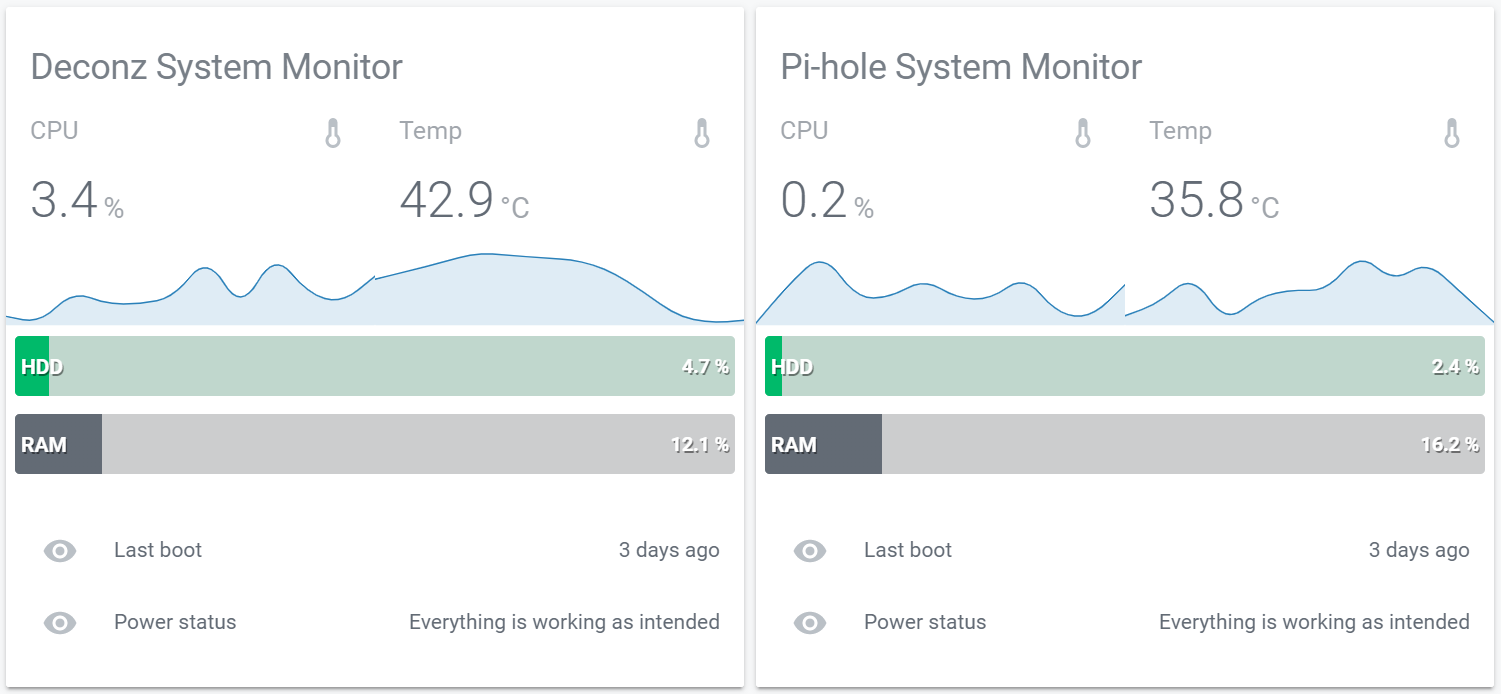System sensors
Based on Sennevds/system_sensors
Changes:
- Network info
- More info about disks
- Added Rust server info
- Control screen with CEC
In addition to the original features:
- CPU usage
- CPU temperature
- Disk usage
- Memory usage
- Power status of the RPI
- Last boot
- Last message received timestamp
- Swap usage
- Wifi signal strength
- Amount of upgrades pending
- Disk usage of external drives
- Hostname
- Host local IP
- Host OS distro and version
System Requirements
You need to have at least python 3.6 installed to use System Sensors.
Installation:
- Clone this repo >> git clone https://github.com/brantje/system-sensors
- cd system_sensors
- pip3 install -r requirements.txt
- sudo apt-get install python3-apt
- Edit settings_example.yaml in "~/system_sensors/src" to reflect your setup and save as settings.yaml:
| Value | Required | Default | Description |
|---|---|---|---|
| hostname | true | \ | Hostname of the MQTT broker |
| port | false | 1883 | Port of the MQTT broker |
| user | false | \ | The userlogin( if defined) for the MQTT broker |
| password | false | \ | the password ( if defined) for the MQTT broker |
| deviceName | true | \ | device name is sent with topic |
| deviceManufacturer | true | \ | device manufacturer is sent with topic |
| deviceModel | true | \ | device model is sent with topic |
| client_id | true | \ | client id to connect to the MQTT broker |
| timezone | true | \ | Your local timezone (you can find the list of timezones here: time zones) |
| update_interval | false | 60 | The update interval to send new values to the MQTT broker |
| check_available_updates | false | false | Check the # of avaiblable updates |
| enable_rust_server | false | false | Enable checking of rust server |
| rust_server_ip | false | localhost | Rust server ip |
| rust_rcon_port | false | 28016 | RCON Port of Rust server |
| rcon_password | false | \ | RCON Password |
| check_wifi_strength | false | false | Check the wifi strength |
| external_drives | false | \ | Declare external drives you want to check disk usage of (see example settings.yaml) |
- python3 src/system_sensors.py src/settings.yaml
- (optional) create service to autostart the script at boot:
- sudo cp system_sensors.service /etc/systemd/system/system_sensors.service
- edit the path to your script path and settings.yaml. Also make sure you replace pi in "User=pi" with the account from which this script will be run. This is typically 'pi' on default raspbian system.
- sudo systemctl enable system_sensors.service
- sudo systemctl start system_sensors.service
Home Assistant configuration:
Configuration:
The only config you need in Home Assistant is the following:
mqtt:
discovery: true
discovery_prefix: homeassistantLovelace UI example:
I have used following custom plugins for lovelace:
- vertical-stack-in-card
- mini-graph-card
- bar-card
Config:
- type: 'custom:vertical-stack-in-card'
title: Deconz System Monitor
cards:
- type: horizontal-stack
cards:
- type: custom:mini-graph-card
entities:
- sensor.deconzcpuusage
name: CPU
line_color: '#2980b9'
line_width: 2
hours_to_show: 24
- type: custom:mini-graph-card
entities:
- sensor.deconztemperature
name: Temp
line_color: '#2980b9'
line_width: 2
hours_to_show: 24
- type: custom:bar-card
entity: sensor.deconzdiskuse
title: HDD
title_position: inside
align: split
show_icon: true
color: '#00ba6a'
- type: custom:bar-card
entity: sensor.deconzmemoryuse
title: RAM
title_position: inside
align: split
show_icon: true
- type: entities
entities:
- sensor.deconzlastboot
- sensor.deconzpowerstatusExample:





